| |
|
|
|
|
|
|
|
|
|
|
| |
| |
 |
|
| |
田润德 编译
文/图 2025-10-29 19:36 |
|
| |
|
|
|
|
| |
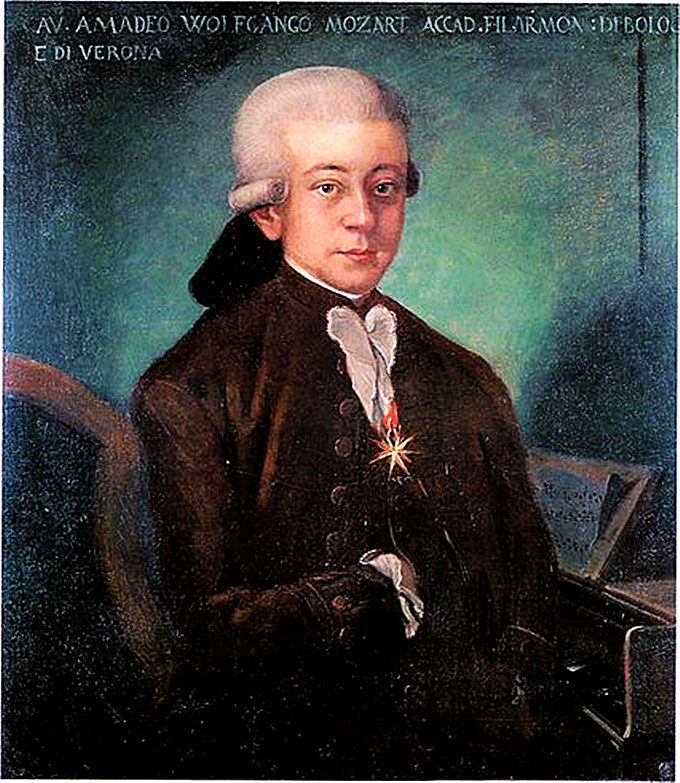 |
|
|
|
| |
沃尔夫冈·阿玛迪乌斯·莫扎特,Wolfgang Amadeus Mozar
1756-1791) |
|
|
|
| |
|
|
| |
【莫扎特/克伦佩勒】唐璜序曲 K.527|新爱乐管弦乐团
|
|
|
|
| |
曲:Don Giovanni K527: Overture
作曲:Wolfgang Amadeus Mozart(沃尔夫冈·阿马德乌斯·莫扎特)
指挥:Otto Klemperer(奥托·克伦佩勒)
演奏:New Philharmonia Orchestra(新爱乐管弦乐团)
专辑:Otto Klemperer Conducts Mozart
℗ A Warner Classics release, ℗ 1965, 2000 Parlophone
Records Limit
|
|
|
|
| |
|
|
|
|
| |
音乐历史上的今天
1787年10月29日,在《唐乔万尼》上演前几个小时,有人提醒莫扎特他还没写序曲。于是,他让妻子谁备好潘趣酒,并整晚给他说童话故事,直到序曲完成。“当乐谱被放在乐队的谱架上时,好几页的墨水都还没有干透”(乐队的低音提琴手温泽·斯沃伯
达语)。
神童在很多人都认为莫扎特只不过是早熟的孩童而已,但殊不知很多早熟的在时代人成熟之后,并未成龙成凤,没有奇迹发生,而消失在茫茫的众生之中。然而。这之中莫扎特是一个不可思议的例外,因为他先是神童,后是巨匠。特别值得我们注意的是,莫扎特的学生贝多芬按照莫扎特的足迹奋斗一生,如普罗米修斯一样的劳作,乐谱写了改改了撕,他常常扼住命运的咽喉,和命运抗争了一辈子,最后好不容易到达了一个辉煌的顶峰,但他发现,莫扎特一生下来就已经在那了!所以日本音乐家门马直卫曾做过恰当的概括:“莫扎特是天之骄子,从天而降,贝多芬则是大地之子,升入苍穹。”
尽管莫扎特被普遍认为是有史以来最伟大的作曲家之一,但随着他的去世,他的音乐并没有达到应有的广泛流传。或许是由于莫扎特的音乐过于完备了,他的所有作品自身结构完美无缺,很难想像其他作曲家若以此为基础,将如何进行模仿或发展。对莫扎特的音乐有多种描述的词汇,如神圣的、纯洁的、高雅优美的和令人愉快的。他的作品中包容了无比丰富的情感,从完美的音乐表现形式到音乐中所蕴涵的乐观、自信,已超出了单纯情感表现的范畴。《g小调交响曲》K183、《唐·璜》K527、《d小调安魂曲》K626(未完成),在莫扎特的全部代表作品中属于含有悲剧色彩的一类。
今日视频:1、莫扎特《唐璜》序曲 K.527,克伦佩勒指挥新爱乐管弦乐团;2、莫扎特歌剧《唐璜》大都会歌剧院。 |
|
|
|
| |
 |
|
| |
沃尔夫冈·阿玛迪乌斯·莫扎特,Wolfgang Amadeus Mozar
1756-1791) |
|
|
|
| |
莫扎特的经典歌剧——唐璜 |
|
|
|
| |
这出闹剧与悲剧的综合体,可以说是空前绝后、无与匹敌的。莫扎特在他最著名的歌剧中,描述西班牙贵族唐璜玩弄感情、杀人、放荡不羁的浪子生活。故事的开端是唐璜正想轻薄骑士长的女儿安娜
(Anna)时,被骑士长发现,在决斗中他把骑士长杀了。之后他还诱惑了贵族少女埃维拉。
剧中的主人公唐·璜是中世纪西班牙的一个专爱寻花问柳的胆大妄为的典型人物,他既有反面人物特点,也有正面的人物性格,既厚颜无耻,但又勇敢、机智、不信鬼神;他利用自己的魅力欺骗了许多村女和小姐们,但他终于被鬼魂拉进了地狱;他本质上是反面人物,但又具有一些正面的特点。所有剧情都是围绕唐·璜和为了保护自己的女儿而被唐·璜杀死的司令官这个中心而发展的。
歌剧 《唐·璜》把生活和哲理的因素揉合在一起,着重于人物的心理刻画,为十九世纪大为发展的音乐心理戏剧开创了先例。
歌剧的中心思想,在它的序曲中已经有了具体的反映。这首序曲用奏鸣曲的形式写成,其中的主题主要描写 唐·璜
那种玩世不恭的性格,充满生命力和火热的情绪,是乐观和愉快的形象。 莫扎特把序曲同歌剧直接联系在一起,这也是本剧的一大特色。
莫扎特的《唐璜》是一部喜歌剧,作于1787年,由蓬特撰写脚本。蓬特根据贝尔塔迪的脚本《石客记》改编。首次把唐璜这个人物写成戏剧的是莫利纳的《塞维利亚的淫棍和食客》和莫里哀的《石宴》。14世纪西班牙传奇人物唐璜用意大利语称为唐.乔万尼。蓬特在撰写此剧时,强调了唐璜追逐女性的失败。
|
|
|
|
| |
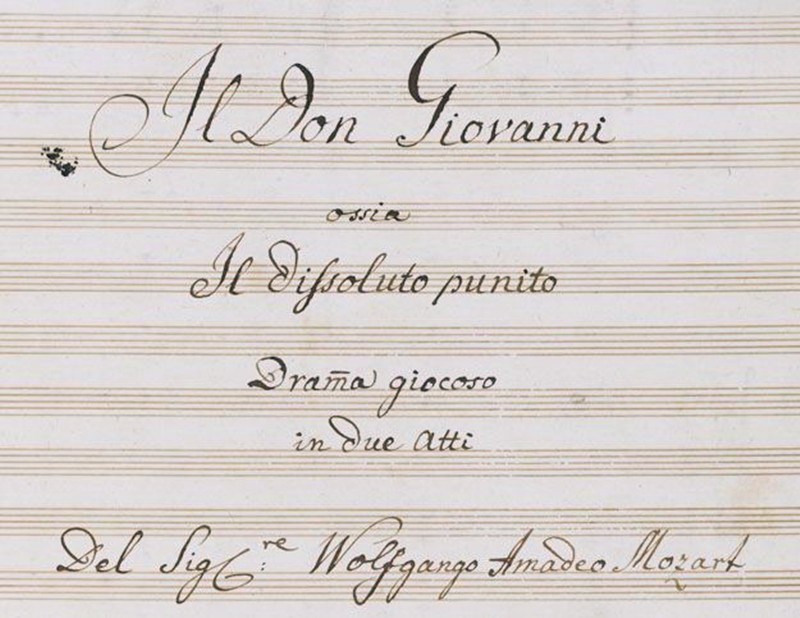 |
|
| |
莫扎特歌剧《唐璜》手稿封面 |
|
|
|
| |
 |
|
|
|
| |
莫扎特歌剧《唐璜》手稿首页 |
|
|
|
| |
 |
|
|
|
| |
莫扎特歌剧《唐璜》海报 |
|
|
|
| |
Mozart's
classic opera - Don Giovanni |
|
|
|
| |
This complex of a farce and tragedy can be said to be unprecedented and
unparalleled. In his most famous opera, Mozart depicted the Spanish
nobleman Don Juan as a philandering, murderous, and unrestrained
libertine. The story begins when Don Juan is trying to seduce the
daughter of the knight, Anna (Anna), and is discovered by the knight. In
the duel, he kills the knight. Later, he also seduced the noble girl,
Evela. The protagonist of the opera, Don Juan, is a typical figure of a
bold and audacious person in medieval Spain, who has both negative
characteristics and positive personality traits. He is shameless but
also brave, intelligent, and does not believe in ghosts and gods. He
uses his charm to deceive many village girls and young ladies, but he
eventually falls into hell due to a ghost. He is essentially a negative
character, but also has some positive characteristics. All the plot
revolves around Don Juan and the commander who was killed by Don Juan to
protect his daughter. The central idea of the opera "Don Juan" combines
elements of life and philosophy, focusing on the psychological portrayal
of the characters, and laid the foundation for the significant
development of musical psychological drama in the 19th century. The
central idea of the opera is already specifically reflected in its
prelude. This prelude is written in sonata form, and the main theme
mainly describes Don Juan's cynical personality, full of vitality and
passionate emotions, presenting an optimistic and cheerful image. Mozart
directly linked the prelude to the opera, which is also a major feature
of this opera. Mozart's "Don Juan" is a comic opera, composed in 1787,
with the script written by Ponte. Ponte adapted it from Belladetti's
script "The Travellers". The first time this character was written as a
drama was in Molina's "The Seducer and the Feast of Seville" and
Molière's "The Stone Feast". The 14th-century Spanish legendary figure
Don Juan was called Don Giovanni in Italian. Ponte emphasized Don Juan's
failure in pursuing women when writing this opera.
|
|
|
|
| |
 |
|
|
|
| |
唐璜电影海报 |
|
|
|
| |
莫扎特的歌剧《唐璜》的剧情和那些著名的创作花絮 |
|
|
|
| |
剧情简介
《唐璜》,全名《浪子终受罚,或唐璜》,是一部两幕歌剧,由洛伦佐·达·彭特撰写剧本,莫扎特作曲。它巧妙地将戏剧和喜剧元素融合在一起,讲述了一个放荡不羁的贵族最终受到神圣惩罚的故事。
核心情节:
开场与谋杀: 在塞维利亚,贵族唐璜试图侵犯总督的女儿安娜,安娜的父亲总督闻讯赶来与唐璜决斗,结果被唐璜杀死。唐璜和他的仆人莱波雷洛仓皇逃离。
浪子的足迹:
唐璜毫无悔意,很快又盯上了即将结婚的农村姑娘采琳娜,甚至企图引诱她,但被及时赶来的安娜(她已认出唐璜是杀父仇人)和她的未婚夫奥塔维奥,以及被唐璜抛弃的贵妇埃尔维拉打断。
唐璜举办宴会,邀请采琳娜,再次企图不轨,但又被埃尔维拉等人揭穿,在一片混乱中逃脱。
墓地与石像: 唐璜在墓园里遇到了总督的石像,他戏谑地邀请石像共进晚餐。令人毛骨悚然的是,石像点头接受了邀请。
终局与惩罚:
当晚,石像如约而至。莱波雷洛吓得魂不附体。石像要求唐璜忏悔他的罪行,但傲慢的唐璜坚决拒绝,声称不怕下地狱。最终,地面裂开,火焰涌出,一群恶魔将拒不悔改的唐璜拖入了地狱。
尾声: 其他角色登场,讲述唐璜的结局,并以此作为道德训诫:“恶人终有恶报”。全剧在六重唱中结束。
创作花絮与轶事
《唐璜》的创作过程本身就像一部戏剧,充满了传奇色彩。
“最后一分钟”的序曲:
这是关于《唐璜》最著名的轶事。歌剧于1787年10月29日在布拉格首演,而直到首演前夜(10月28日晚上),莫扎特还没有写下序曲。
当晚,他没有睡觉,在妻子的陪伴下(她给他讲童话故事以防他睡着),一气呵成创作了这首著名的序曲。乐手们是在当天早上才拿到乐谱,直接进行“视奏”演出的,据说墨水都还没完全干透。尽管时间紧迫,这首序曲却成为了歌剧史上最伟大的作品之一,它开头的几个和弦就直接预示了剧中石像出现的恐怖场景。
为布拉格而作:
《唐璜》是莫扎特为热情的布拉格观众创作的。他的上一部歌剧《费加罗的婚礼》在布拉格取得了巨大成功,远超在维也纳的反响。因此,当地剧院经理委托他创作一部新歌剧,莫扎特选择了当时流行的“唐璜”题材。
首演成功:
尽管序曲是临时赶工,但《唐璜》的首演获得了巨大的成功。布拉格的观众对莫扎特的天才报以热烈的欢呼。这证明了莫扎特在巨大压力下依然能保持惊人的创作水准。
“顽石必须登场”:
传说在排练时,扮演石像的歌手觉得自己的唱段太难,希望莫扎特能修改。莫扎特亲自上台示范,唱得完美无缺,然后对那位歌手说:“你看到吗?这段是能唱出来的。如果你能做到像我一样,那当然很好;如果不能,那你就只能继续排练,因为这段音乐一个字也不能改。”
这展现了莫扎特对艺术要求的坚持。
体裁的独特性:
莫扎特本人将这部歌剧定义为“喜歌剧”,但剧中包含了谋杀、超自然力量和地狱惩罚等严肃黑暗的元素。这种独特的混合体,使得后人常常称《唐璜》为“谐歌剧”,因为它超越了传统喜歌剧的范畴,具备了深刻的悲剧内涵。
总而言之,《唐璜》不仅是一部剧情跌宕起伏、音乐无与伦比的杰作,其诞生过程本身——尤其是那首在首演前夜诞生的序曲——也成为了音乐史上最能体现莫扎特“天才”特质的传奇故事
。
|
|
|
|
| |
 |
|
| |
莫扎特唐璜雕塑 |
|
| |
 |
|
| |
|
|
|
|
| |
The plot of
Mozart's opera "Don Giovanni" and those famous creative anecdotes |
|
|
|
| |
Synopsis:
"Don Giovanni", originally titled "The Wretch Receives His Punishment,
or Don Giovanni", is a two-act opera written by Lorenzo da Ponte and
composed by Mozart. It ingeniously combines elements of drama and
comedy, telling the story of a dissolute nobleman who ultimately
receives a divine punishment. Core Plot: Opening and Murder: In Seville,
Don Giovanni attempts to violate the daughter of the governor, Anna.
Anna's father, the governor, arrives and engages in a duel with Don
Giovanni, who is killed. Don Giovanni and his servant Leopoldo flee in a
panic. Footprints of the Wretch: Don Giovanni shows no remorse and soon
targets the rural girl, Celia, who is about to get married. He even
attempts to seduce her, but is interrupted by Anna (who has recognized
Don Giovanni as the killer of her father), her fiancé Otavio, and the
abandoned noblewoman Elvira. Don Giovanni holds a banquet and invites
Celia again, attempting to act improperly once more, but is interrupted
by Elvira and others. In a chaotic scene, he escapes. Cemetery and Stone
Statue: Don Giovanni encounters the governor's stone statue in the
cemetery. He playfully invites the statue to have dinner. Horrifyingly,
the statue nods in acceptance. Conclusion and Punishment: That night,
the statue arrives as promised. Leopoldo is terrified out of his wits.
The statue demands that Don Giovanni confess his sins, but the arrogant
Don Giovanni refuses, claiming he is not afraid of going to hell.
Finally, the ground cracks, flames erupt, and a group of demons drag the
unrepentant Don Giovanni into hell. Epilogue: Other characters appear to
tell the story of Don Giovanni's ending, serving as a moral lesson:
"Evil men will eventually receive their punishment." The opera ends with
a six-part aria. Creative Details and Anecdotes: The creation process of
"Don Giovanni" is itself like a drama, full of legendary elements. "The
Last Minute" Overture: This is the most famous anecdote about "Don
Giovanni". The opera premiered in Prague on October 29, 1787, and until
the night before the premiere (October 28), Mozart had not written the
overture. That night, he did not sleep and, accompanied by his wife (who
told him fairy tales to prevent him from falling asleep), he composed
this famous overture in one go. The musicians received the score that
morning and performed the "improvised" performance directly. It is said
that the ink was not completely dry. Despite the tight schedule, this
overture became one of the greatest works in opera history, with the
opening chords directly foreshadowing the terrifying scene of the stone
statue's appearance. Composed for Prague: "Don Giovanni" was composed by
Mozart for the passionate Prague audience. His previous opera "The
Marriage of Figaro" had achieved great success in Prague, far exceeding
the response in Vienna. Therefore, the local theater manager
commissioned him to create a new opera, and Mozart chose the popular
"Don Giovanni" theme. Premiere Success: Although the overture was
rushed, the premiere of "Don Giovanni" was a huge success. The audience
in Prague greeted Mozart's genius with enthusiastic cheers. This proved
that Mozart could maintain an astonishing creative level under great
pressure. "The Stone Must Appear": Legend has it that during rehearsals,
the singer playing the stone statue felt that his part was too difficult
and hoped Mozart could modify it. Mozart personally demonstrated and
sang flawlessly, then said to the singer, "You see? This part can be
sung. If you can do it like me, that would be great; if not, then you
can only continue to rehearse because this music cannot be changed a
single word." This shows Mozart's insistence on artistic requirements.
The uniqueness of the genre: Mozart himself defined this opera as a
"comedy of mirth", but it contains serious and dark elements such as
murder, supernatural powers, and hellish punishment. This unique mixture
often makes "Don Giovanni" be called "harmonious opera" because it
transcends the traditional scope of "comedy of mirth" and possesses
profound tragic connotations. In conclusion, "Don Giovanni" is not only
a masterpiece with a thrilling plot and unparalleled music, but its
creation process itself - especially the pre-performance overture that
was composed on the eve of the premiere - has also become a legendary
story in the history of music that best showcases Mozart's "genius"
traits. |
|
|
|
| |
 |
|
| |
埃斯特剧院、《唐·乔瓦尼》莫扎特作品、布拉格歌剧院(位于捷克共和国) |
|
|
|
| |
The Estates Theatre, Don Giovanni Mozart, Prague Opera House Czech
Republic |
|
|
|
| |
莫扎特《唐·乔万尼》的珍贵录音集 |
|
|
|
| |
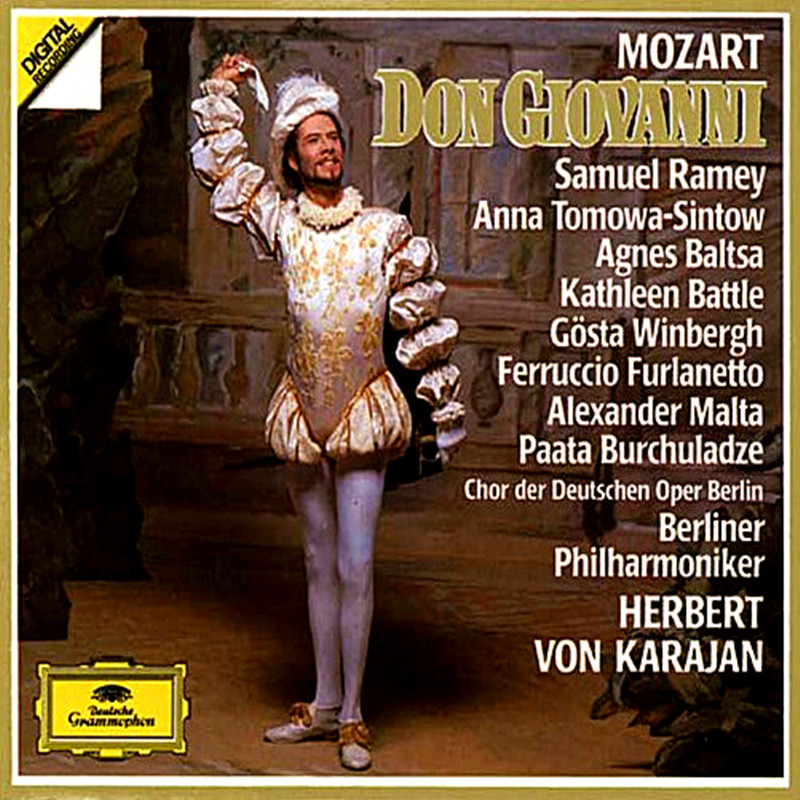 |
|
|
|
| |
在赫伯特·冯·卡拉扬的最后一部莫扎特歌剧录音作品(德意志留声机公司,1985
年)中,有一种不可避免的慵懒之感弥漫其中。这位奥地利指挥家的辉煌岁月显然已经过去,但他仍时不时地将自己的一些才华融入到表演之中。这张唱片拥有有史以来最出色的主仆间默契配合效果,塞缪尔·拉米的乔瓦尼、费鲁奇奥·弗卢兰内托的莱波雷洛、凯瑟琳·巴特尔饰演的才华横溢的泽尔琳娜以及帕塔塔·布奇卢达泽饰演的引人注目的指挥官等角色都表现出色。但其余演员的表现参差不齐,阿格尼斯·巴尔塔作为埃尔维拉的表演还算不错,但安娜·托莫瓦-辛托和戈斯塔·温伯赫作为安娜和奥塔维奥的表演则稍显逊色。
There is an inevitable sense of lethargy within Herbert von Karajan’s
last Mozart opera studio recording (Deutsche Grammophon, 1985). The
Austrian maestro’s best days were clearly behind him, but he still
managed to inject some of his brilliance into the performance from time
to time. The recording boasts one of the best master-servant dynamics in
recorded history with Samuel Ramey’s Giovanni and Ferruccio Furlanetto’s
Leporello, along with Kathleen Battle as a brilliant Zerlina and Paata
Burchuladze as a striking Commendatore. The rest of the cast is uneven,
with Agnes Baltsa as Elvira doing mostly well, but Anna Tomowa-Sintow
and Gösta Winbergh as Anna and Ottavio less so. |
|
|
|
| |
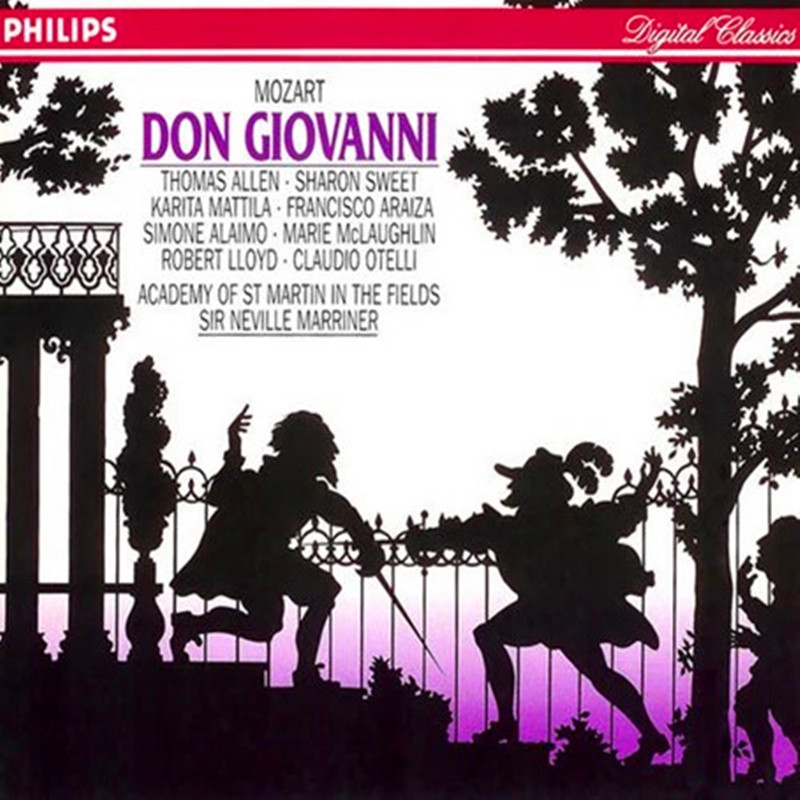 |
|
|
|
| |
内维尔·马林爵士于 1991
年为飞利浦公司录制的版本节奏明快、扣人心弦,由托马斯·艾伦担任指挥,是当今演绎多尼·乔瓦尼这一角色最出色的艺术家之一。他魅力十足,但心怀阴谋且邪恶。弗朗西斯科·阿拉伊萨为我们呈现了历史上最出色的多尼·奥塔维奥之一,他英勇而英勇无畏,同时又深情且动人。卡里塔·马蒂拉饰演的多娜·埃尔维拉意志坚定,对角色的演绎也非常出色。其余演员阵容,就像卡拉扬的团队一样,表现参差不齐。 |
|
|
|
| |
Sir Neville Marriner’s 1991 version for Philips, swift and compulsive,
is led by Thomas Allen as one of the best modern Don Giovannis. Charming
but scheming and evil. Francisco Araiza gives us one of the best Don
Ottavios in history, gallant and heroic, but also intimate and touching.
Karita Mattila as Donna Elvira is determined and plays her character
very well. The rest of the cast, like Karajan’s, is very inconsistent. |
|
|
|
| |
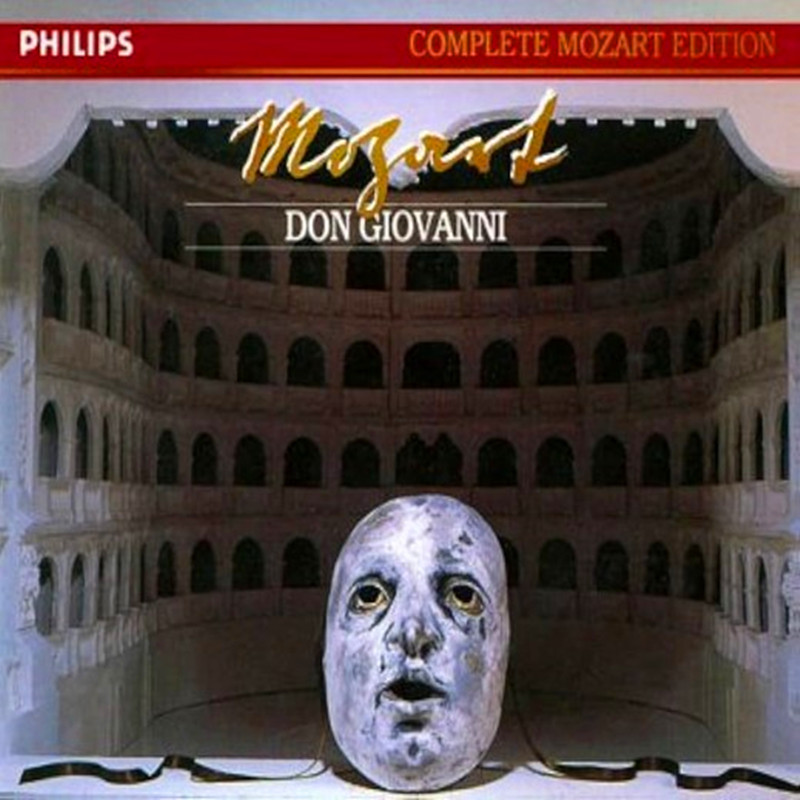 |
|
|
|
| |
1972
年的这张菲利普斯唱片体现了科林·戴维斯爵士对作曲家和作品的卓越理解。女演员阵容堪称该唱片中的佼佼者,被低估的玛蒂娜·阿罗约饰演的多娜·安娜令人惊叹,基里·特·卡纳瓦饰演的多娜·埃莉维拉美丽动人,米雷拉·弗雷尼饰演的泽尔丽娜更是无人能及。然而男演员们的表现则相形见绌,尽管英格瓦尔·维塞尔饰演的乔瓦尼和斯图尔特·伯罗斯饰演的奥塔维奥表现尚可,但整体而言仍无法与女演员们相媲美。 |
|
|
|
| |
The 1972 Philips recording is characterised by Sir Colin Davis’ superb
understanding of both the composer and the work. The female cast is one
of the very best in the discography, with the underrated Martina Arroyo
as an amazing Donna Anna, Kiri Te Kanawa as a lovely Donna Elvira and
Mirella Freni as an unsurpassable Zerlina. The male cast, on the other
hand, doesn’t come close, although Ingvar Wixell as Giovanni and Stuart
Burrows as Ottavio give a decent account of themselves. |
|
|
|
| |
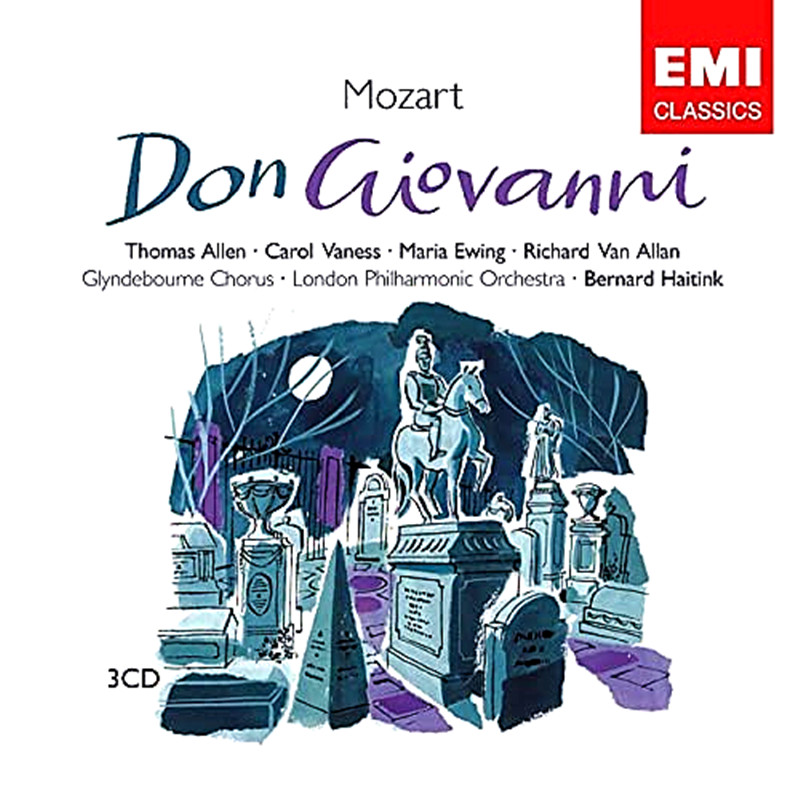 |
|
|
|
| |
伯纳德·海廷克于 1983 年为
EMI/华纳公司录制的版本轻快且细节丰富。从第一小节到最后一小节,指挥家、歌唱者与乐团之间清晰的默契展露无遗。托马斯·艾伦继续证明了他为何是录制史上最出色的多尼·乔瓦尼之一,这与他八年后与马里纳合作时的表现相似,但更具激情和冲动,但也因此在一定程度上牺牲了对角色的理解,而这种理解往往是随着演唱经验的积累而逐渐形成的。多娜·安娜和多娜·埃尔维拉由卡罗尔·瓦内斯和玛丽亚·埃温饰演,前者充满表现力,后者则充满坚韧和复仇精神。其余演员虽然个人表现不尽如人意,但在指挥家的协助下也表现得还算不错。 |
|
|
|
| |
Bernard Haitink’s 1983 version for EMI/Warner is light and full of
detail. The clear understanding between conductor, singers and orchestra
is evident from the first note to the last. Thomas Allen continues to
show why he is one of the best Don Giovannis in recorded history,
similar to his performance with Marriner eight years later, but more
fiery and impulsive, at the expense of some of the understanding of the
character that inevitably comes with experience singing the role. Donna
Anna and Donna Elvira are masterfully sung by Carol Vaness and Maria
Ewing, the former full of expression and the latter full of tenacity and
vengeance. The rest of the cast, though not so good individually, do
reasonably well with the help of the conductor. |
|
|
|
| |
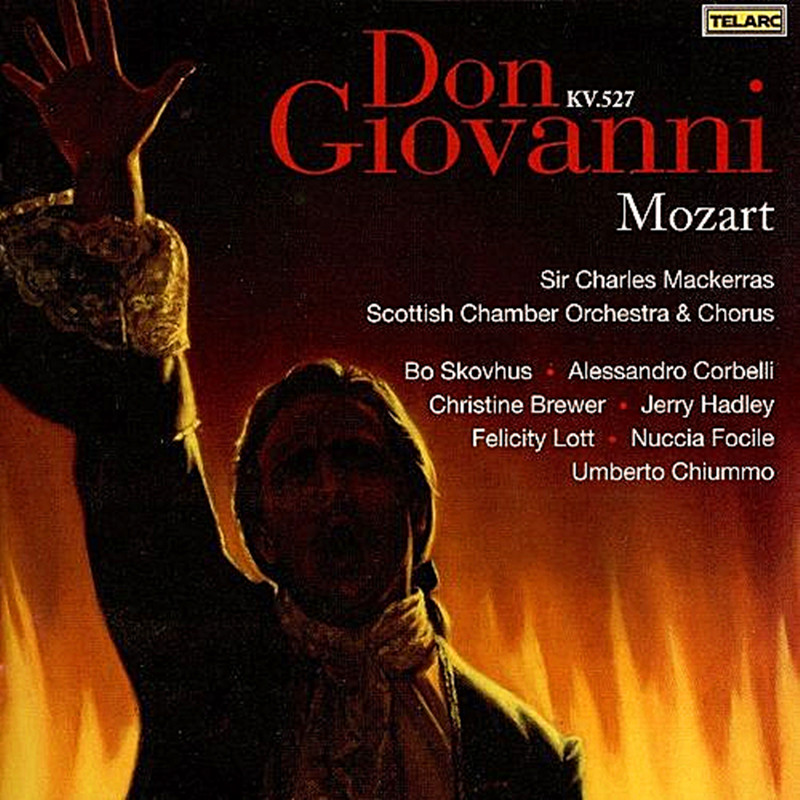 |
|
|
|
| |
在 1995
年的特拉克唱片版中,查尔斯·麦卡雷爵士和苏格兰室内管弦乐团呈现了这部作品极具亲和力且独具特色的演绎版本,这种演绎感觉像是采用了古乐器演奏方式,但使用的是现代乐器。博·斯科夫胡斯是该唱片中的演唱亮点,他成功地掌控了《唐·乔万尼》的每一个方面。杰里·哈德利或许没有像阿亚拉或德莫塔那样的男高音那样优雅,但他饰演的唐·奥塔维奥仍令人印象深刻,而亚历山德罗·科尔贝利饰演的莱波雷利虽然缺乏必要的音量,但凭借其喜剧天赋弥补了这一不足。其余的独唱演员并没有为这场演出做出任何提升。
In the 1995 Telarc version, Sir Charles Mackerras and the Scottish
Chamber Orchestra deliver a very intimate and unique version of the
work, which feels like a period instrument approach but with modern
instruments. Bo Skovhus is the vocal highlight of the recording,
managing to dominate every aspect of Don Giovanni. Jerry Hadley, perhaps
lacking the elegance of other tenors such as Araiza or Dermota, makes a
memorable Don Ottavio, while Alessandro Corbelli’s Leporello lacks the
necessary vocal weight but compensates with a gift for comedy. The rest
of the soloists don’t do anything to improve the performance. |
|
|
|
| |
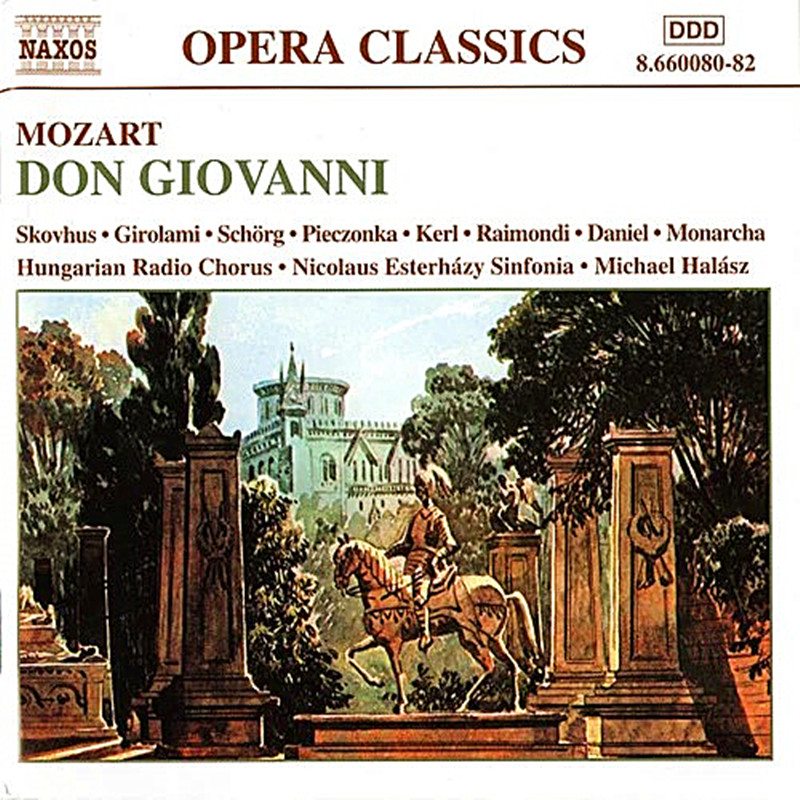 |
|
|
|
| |
纳索唱片公司 2000
年发行的这张唱片在演奏方式和音乐风格上更为传统。由迈克尔·哈拉斯负责指挥,尽管他的演奏并无不当之处,但对这部作品的驾驭却缺乏深度。博·斯科夫胡斯再次饰演了出色的唐·多纳一角,不过这一次他得到了更出色的乐团阵容的配合,其中包括阿德里安娜·皮泽诺卡饰演的出色的唐娜安娜、雷纳托·杰罗拉米饰演的机智的莱波雷洛以及瑞吉娜·舍尔格饰演的比以往更轻盈但热情四溢的唐娜埃尔维拉。
The 2000 recording for Naxos is more conventional in its approach and
musical direction. Michael Halász is in charge, and while he doesn’t do
anything wrong, his command of the work lacks depth. Bo Skovhus is once
again a superb Don, but this time he is supported by a better ensemble,
including Adrianne Pieczonka’s fantastic Donna Anna, Renato Girolami’s
witty Leporello and Regina Schörg’s lighter than usual but fiery Donna
Elvira.
|
|
|
|
| |
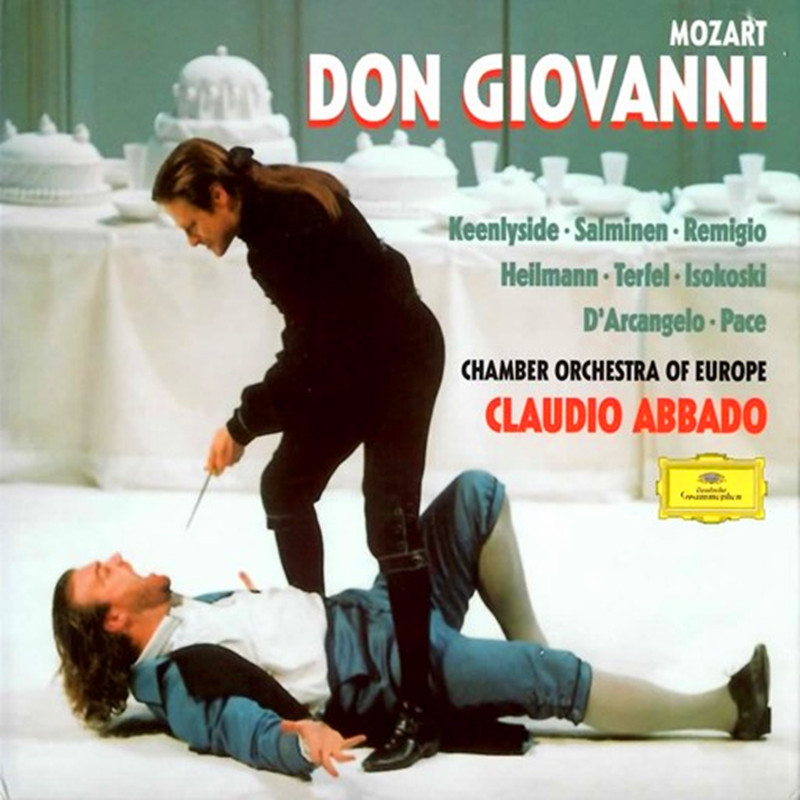 |
|
|
|
| |
克劳迪奥·阿巴多并非一直都能很好地诠释莫扎特的歌剧作品,但在为德意志留声机公司录制的 1997
年版中,他表现得相当出色。他的演绎方式更有利于那些较为严肃的角色和场景,但却削弱了歌剧中的喜剧元素。西蒙·基尼利斯德饰演的聪明的多尼·乔瓦尼与布林·特菲尔饰演的活泼的莱波雷洛之间的主仆关系是此次演出的一大亮点,还有卡梅拉·雷米吉奥饰演的安娜和索莱·伊索科斯基饰演的埃尔维拉也十分出色。乌韦·海尔曼虽然是一位出色的男高音,但在此次录制中似乎并未发挥出最佳水平。
Claudio Abbado hasn’t always been at ease with Mozart’s operas, but he
does very well in this 1997 recording for Deutsche Grammophon. His
approach benefits the more serious characters and scenes, but takes away
some of the opera’s comedy. The master-servant dynamic between Simon
Keenlyside’s intelligent Don Giovanni and Bryn Terfel’s lively Leporello
is one of the highlights of the performance, along with Carmela
Remigio’s Anna and Soile Isokoski’s Elvira. Uwe Heilmann, though a fine
tenor, doesn’t seem to be at his best on this recording.
|
|
|
|
| |
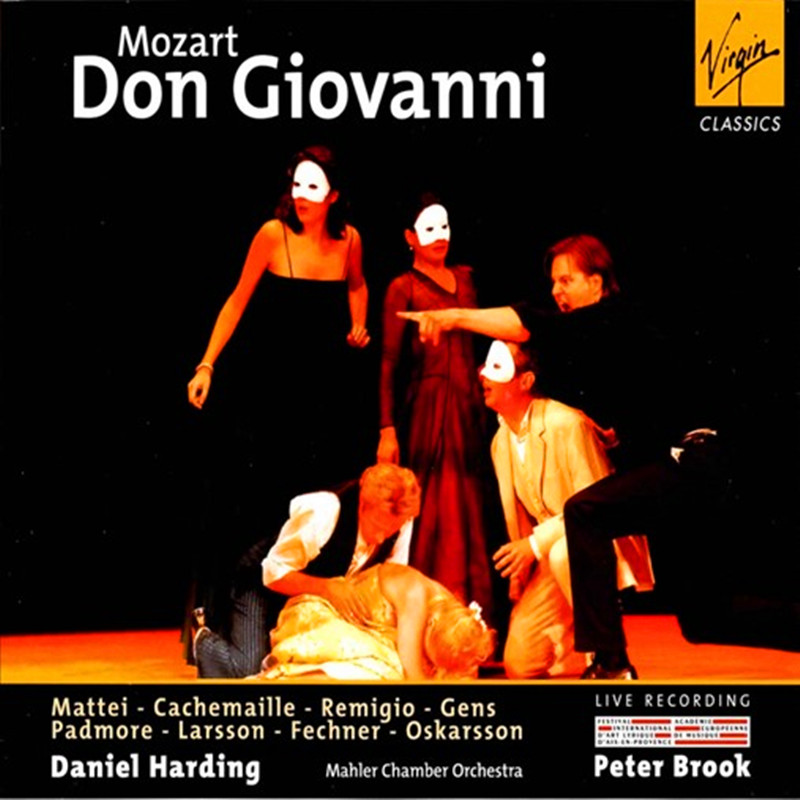 |
|
|
|
| |
这段现场录音于 1999
年在阿基翁普罗旺斯录制,由维京古典/埃拉托唱片公司发行。该录音展现了丹尼尔·哈丁指挥马勒室内乐团时那迅猛的音乐指挥风格。尽管它略显粗糙,有时也削弱了这部歌剧某些最具戏剧性的段落的感染力,但这部作品令人兴奋的呈现形式仍有许多值得称赞之处,尤其是在咏叹调和喜剧片段中。彼得·马泰伊饰演的多尼奥堪称完美,他作为歌唱演员的智慧和风趣使他在每一个登场的场景中都能完全掌控局面。在指挥家清晰的指挥下,其余的独唱演员表现出色,与马泰伊形成了一个出色的合奏团队,让马泰伊能够尽情发挥。
This live recording, made in Aix-en-Provence in 1999 for Virgin
Classics/Erato, boasts the blisteringly fast musical direction of Daniel
Harding with the Mahler Chamber Orchestra. Although it lacks polish and
at times takes away from some of the opera’s most dramatic passages,
there is much to be praised in this exciting vision of the work,
particularly in the recitatives and comic passages. Peter Mattei is an
ideal Don Giovanni, his intelligence and wit as a singing actor give him
absolute control of every scene he’s in. Guided by the conductor’s clear
vision, the rest of the soloists do well and form a great ensemble for
Mattei to have his way with. |
|
|
|
| |
|
|
|
|
| |
Today in Music
History:
October 29,
1787. Just a few hours before the performance of "Don Giovanni", someone
reminded Mozart that he hadn't written the overture yet. So, he asked
his wife to prepare some punch and told him fairy tales all night until
the overture was finished. "When the music score was placed on the music
stand of the orchestra, several pages of ink were still not dry" (the
bass violinist of the orchestra, Wenzel Swoboda, said in his own words).
The child
prodigy was regarded by many as merely a precocious child, but little
did they know that many who were precocious did not become great after
their time had passed, no miracles occurred, and they vanished into the
vast crowd. However, among them, Mozart was an incredible exception
because he was both a child prodigy and a master. Particularly worth
noting is that Mozart's student Beethoven, who struggled all his life
following in Mozart's footsteps, worked like Prometheus, rewriting,
tearing up the music scores, and often grasping the throat of fate and
struggling against it for a lifetime. Finally, he managed to reach a
glorious peak, but he discovered that Mozart had already been there
since birth! So, Japanese musician Mihara Tatsuya once made an
appropriate summary: "Mozart was a child of heaven, descending from the
sky, while Beethoven was a child of the earth, ascending to the
heavens." Although Mozart is generally regarded as one of the greatest
composers of all time, after his death, his music did not achieve the
expected wide dissemination. Perhaps it was because Mozart's music was
too complete, all his works had perfect structures on their own, and it
was hard to imagine how other composers would imitate or develop based
on this. There are various descriptive words for Mozart's music, such as
sacred, pure, elegant and beautiful, and pleasant. His works encompass
an incredibly rich range of emotions, from perfect musical forms to the
optimism and confidence contained in the music, going beyond the realm
of simple emotional expression. The "G minor Symphony" K183, "Don
Giovanni" K527, and "D minor Requiem" K626 (unfinished) belong to the
category of works with tragic overtones among all of Mozart's
representative works.
Today's video:
1. Mozart's "Don Giovanni" Overture K.527, conducted by Krenpeler for
the New Philharmonic Orchestra; 2. Mozart's opera "Don Giovanni" at the
Metropolitan Opera. |
|
|
|
| |
|
|
|
|
| |
|
|
| |
歌剧:Don Giovanni 唐璜 (Mozart 莫扎特) Met Opera 大都会歌剧院
2023.5.20
|
|
|
|
| |
本视频来自纽约大都会歌剧院(Metropolitan Opera)2023年春季制作的《唐·乔望尼》(Don
Giovanni)。
由 Nathalie Stutzmann 指挥,这是她在 Met 的首秀。
该场演出录制于 2023年5月20日,并作为 Met Live in HD 系列在全球影院同步放映。
主要阵容
唐·乔望尼 (Don Giovanni):Peter Mattei
莱波雷洛 (Leporello):Adam Plachetka
唐娜·安娜 (Donna Anna):Federica Lombardi
唐娜·艾尔薇拉 (Donna Elvira):Ana María Martínez
唐·奥塔维奥 (Don Ottavio):Ben Bliss
采莉娜 (Zerlina):Ying Fang
马塞托 (Masetto):Alfred Walker
司令 (Commendatore):Alexander Tsymbalyuk
剧情简介
故事讲述风流贵族唐·乔望尼沉迷诱惑与征服,伤害无数女子。
他在杀死唐娜·安娜的父亲后逃亡,却仍不知悔改。
在情人、仆人与受害者的追逐与反抗中,乔望尼最终被命运与良知的化身——石像指挥官带入地狱。
全剧融合喜剧与悲剧、现实与超自然,是莫扎特对人性、罪与惩罚的深刻思考。
制作与风格
这一版由导演 Ivo van Hove 执导,将故事背景移入极简而冷峻的现代建筑空间,利用灯光与投影营造心理化的氛围。
舞台抽离了传统贵族场景,更聚焦于人性与欲望的黑暗面。
Stutzmann 的指挥精准而富于戏剧张力,使莫扎特的配器与声乐线条兼具力量与透明度。 |
|
|
|
| |
未得原作者编者授权严禁转载www.mt77.com任何内容 |
|
|
|
|
|
|
|
|
|
|
|
|
|
|
.png)

